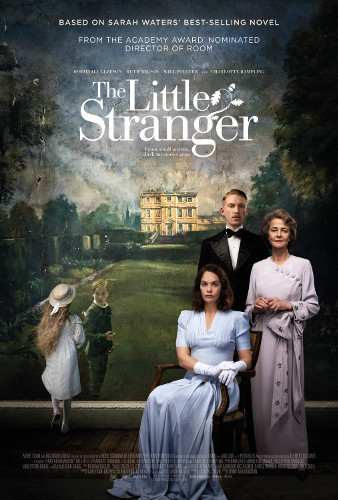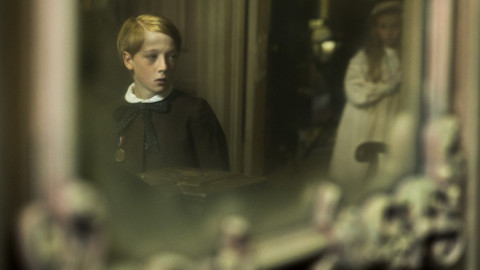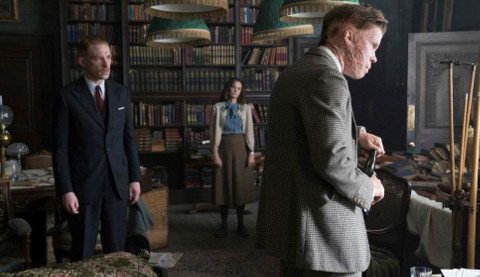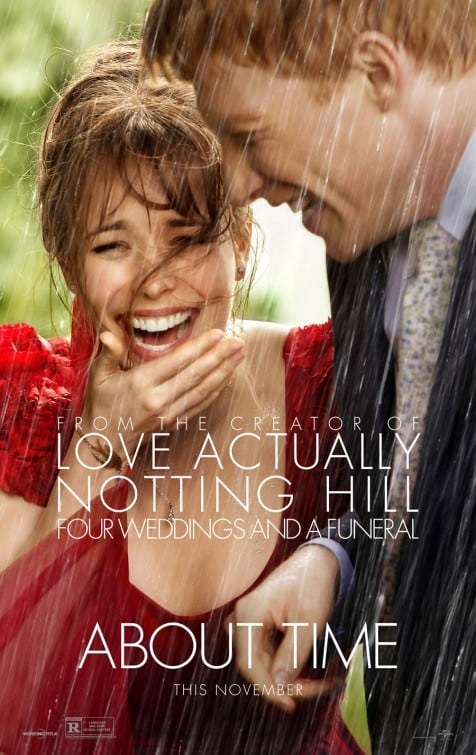The Little Stranger (2018)
Directed by: Lenny Abrahamson
Written by: Lucinda Coxon, Sarah Waters
Starring: Charlotte Rampling, Domhnall Gleeson, Ruth Wilson, Will Poulter
France/Ireland/UK
IN CINEMAS NOW
RUNNING TIME: 101 mins
REVIEWED BY: Dr Lenera, Official HCF Critic
In the summer of 1948, Dr. Faraday, a country psychiatrist with humble beginnings, is called to Hundreds Hall where his mother worked as a servant, to attend to the maid, Betty. The Ayres family – capable Caroline, war-injured brother Roderick and their haughty mother Angela – have fallen on hard times and all seem to be terrified of the house itself – or something in it. Faraday begins to treat Roderick for post-traumatic stress disorder while beginning to form a bond with Caroline, but his visits seem to agitate a mysterious presence in the house….
When I first found out that there was a period ghost story coming from the director of the best film of 2016 [well, it’s listed as a 2015 film but didn’t come out in the UK till the following year], I was about as excited as a film nut can be. Unfortunately the result – well, it’s certainly not a bad picture, in fact it’s a quality production through and through, from acting to cinematography to set design. When viewed as the tale of a man who wants to be a part of a part of upper society but can never really be so, it’s rather poignant. However, it doesn’t really work as a horror film, despite featuring a ghost [I think] in its spooky old house. Now I enjoy and appreciate a restrained, subtle ghost story as much as I enjoy a more full-on offering – The Innocents remains my pic for Greatest Ghost Movie Ever, and Ringu wouldn’t be very far behind. But those films had atmosphere to spare, so that you’re on edge even when little is happening. But The Little Stranger doesn’t really try to be much of a chiller at all throughout much of its running time, which means that I reckon it may bore some horror fans near to death, or at least enough so that they won’t be able to appreciate the many qualities the film does have. And it’s not like The Secret Of Marrowbone which I felt was unfairly criticised for not having enough scares – it’s not as if there wasn’t a whole lot of other interesting stuff going on in that movie, and when they came the frights certainly worked. The Little Stranger doesn’t seem to try to scare except for one or two moments, which is just plain puzzling considering that it features a ghost [probably] who either kills people or causes them to kill themselves.
Still, as I said this film does have many qualities, some of which are evident from the first few minutes as we visit Hundred’s Hall, the 18th century country estate being a perfect location not just for a ghost but an aristocratic dynasty which is gradually wasting away. The house is now in considerable decay while the Ayres family is in severe financial straits. Considering that the man of the house is called Roderick [who even starts a fire], one is probably deliberately being asked to think of Edgar Allan Poe’s The House Of Usher. Due to fighting in World War 2, Roderick has serious burns on his face [excellent makeup here] and legs and limps, and his wife Caroline and mother Angela seem to take charge of everything. Faraday is at the house because maid Betty is supposedly ill, but little seems to be actually wrong with her and she confesses to Faraday that she hoped she would be taken from the house. Nonetheless Faraday visits the house more and more, and the pacing really is slow during the first half of the film. I can’t say I minded too much because of things like the fine nature of the performances and even some of the dialogue, but there’s no doubt that many viewers will be twiddling their thumbs, and consider some of the scenes, such as a lengthy one at a dance, to be extraneous. There’s little attempt at building up the sense of a supernatural presence except for the odd shot of the camera gliding through a doorway or down a passageway, and an early scene of a guest being bloodily [we don’t see the event but certainly linger on the horrific looking aftermath] mauled by the Ayres’s dog is almost misleading.
Flash backs are often inserted, some tiny, some a bit longer, to Faraday’s first visit to Hundred’s Hall as a young boy where he was even allowed to enter, and ended up braking off an ornamental acorn from a mirror frame, something he’s regretted doing ever since. However, Abrahamson doesn’t always seem sure of how to structure this material. For example, it’s rather pointless that we learn about the theft really early on and are then shown it about half way through the film where it has little dramatic effect because we already know of the event and its effect on Faraday – an effect that remains strong even when he confesses about it to Caroline and she laughs it off and says that she and her brother used to do the same often when they were young. And a few bits of narration are especially pointless. At least we’re constantly aware that the young Faraday being seduced by the house and the idea of living in a different world from the one he lives in is still a preoccupation with him. A nice touch is a photograph of Suki, Roderick and Caroline’s young daughter who died when she was young, jumping in front of Faraday so you can barely see him in the picture. He can probably never be a part of upper class society, even as an adult working as a small-town doctor, despite behaving much like a respectable gentleman and gradually ingratiating himself more and more at Hundred’s Hall.
Roderick seems frightened of some strange presence and, despite Faraday treating his leg so that he walks better, appears to be of increasingly unsound mind, so he’s hauled off to an asylum. This is highly convenient, because doctor and patient’s wife seem to be attracted to each other and can now get to know each other more easily. Even I thought that perhaps too much time was spent on this, but eventually some mysterious stratchings turn up, followed by a few other spooky happenings including a moment with someone locked in a room while something seems to be trying to batter down the door which is actually quite frightening and reminded me of that terrifying scene in The Haunting. But Abrahamson and his screenwriter Linda Cox often seem to be sabotaging their film’s effectiveness, such as in a final death scene which is mostly shown from the point of view of someone relating their version of events which have already happened. The victim cries “You”!, but why on earth this person seems surprised at who the ghost is seems ridiculous considering that there isn’t really anybody else the ghost could be, and the film is so bad at keeping it a secret from us [you may have already sussed it out if you’ve been reading this review carefully] that I wondered if it this done on purpose.
But then again there’s quite a bit of ambiguity here, which will probably make you think if you like the film, and will make you just irritated if you don’t. We don’t see any visual proof that the ghost is who we’re led to believe it is. At one point, it’s suggested that supernatural phenomena might be the product of unintended telekinesis, poltergeist-like activity spawned by a living person, not a dead one, which is certainly interesting, but is then just forgotten about. After a while, we realise what it is that Faraday really wants, and we’re left unsure as to how much he loves Caroline of it indeed he loves her at all. The role of Faraday seems tailor made for Domhnall Gleeson [who also starred in Abrahamson’s Frank], the actor’s natural charm combining with his sometimes slightly enigmatic persona to good effect, though I have to say that Ruth Wilson out-acts him in many of the scenes they are together. Meanwhile Abrahamson’s usual composer Stephen Rennick contributes a quite minimalist score which – considering the nature of the film it’s accompanying, could have benefited from being more properly melodic.
While nowhere near as stylishly filmed as Room, The Little Stranger mostly looks great, and there’s some fine use of set design that sometimes reinforce themes or story elements, like the ones taking place in a dark, messy, uninviting room while a huge painting of Hundred’s Hall in its old magnificence hangs on the wall behind. In the end Lenny Abrahamson set himself quite a difficult task with this film – to make a period, Gothic-tinged romantic drama with a haunting on the side – and the fact that he chooses to downplay the fear factor so much is really curious, especially when you consider how many of the old Gothic melodramas had their rather frightening moments even if there wasn’t an actual ghost. The result can only be an unsatisfying experience no matter what your taste leans towards – and yet there’s still a strange resonance to the whole thing that means that on some level the film may work. Supposedly the final act was changed from Sarah Water’s original novel, but the movie’s final scene, of a young Faraday, crying as he stands at the top of the staircase of the house he so wants and looks down, is very affecting and speaks volumes, especially if you realise that more than anything else The Little Stranger is about class, and yearning to be part of something you can never be, and perhaps finding that the grass is always greener on the other side.
Rating: 

















Be the first to comment